定语从句的整合与拆分
立刻说:怎么拆分定语从句

怎样拆分定语从句要彻底理解定语从句,一定要运用“拆分”的思想,把主句+很长的定语从句拆分开来。
I am looking for a man who is rich, cute and well-educated.我在寻找一个有钱,帅,而且很有教养的男生。
首先把这个定语从句拆分:1. I am looking for a man.2. The man is rich, cute and well-educated.接下来组合:I am looking for (a man the man) is rich, cute and well-educated.括号内a man和the man信息重复了,位于前面的词称之为先行词,后面一词我们可以把它叫做“后行词”。
既然信息重复,为什么不能干脆删掉后行词?如果直接删掉后行词,会导致一个句子有两套主谓,关系会变得混乱,例如:I am looking for a man is rich, cute and well-educated.如果直接保留后行词,会造成重复,为了避免重复(众所周知,英文最讨厌重复),我们将后行词进行转变,在上例中the man变为who,经过转变之后,后行词除了具备原来的词义之外,还增加了连词的作用。
一、Who/whom后行词是人,就用who/that来替代。
但是如果后行词是宾格,即him,them,her,可以用whom进行替代,也可以直接用who。
He is the boy who/whom I will go to shanghai with.拆分:1. He is the boy.2. I will go to shanghai with him.这两句的关联部分就是the boy和him,也就是所谓的先行词和后行词。
为了衔接连贯,后行词需要前置,句2就变成:Him I will go to shanghai with.然后再将him替换为who或者whom:He is the boy who/whom I will go to shanghai with.有的时候,介词和后行词的关系十分密切,如果只前置后行词,它们的修饰关系就不明显,所以通常是将后行词和介词一起前置:With him I will go to shanghai.这个时候就只能使用whom替换him,把句子变成:He is the boy with whom I will go to shanghai.而不能写成这种形式:He is the boy with who I will go to shanghai二、Which/that后行词是表事物的名词,就用which或者that替换。
如何合并定语从句句子
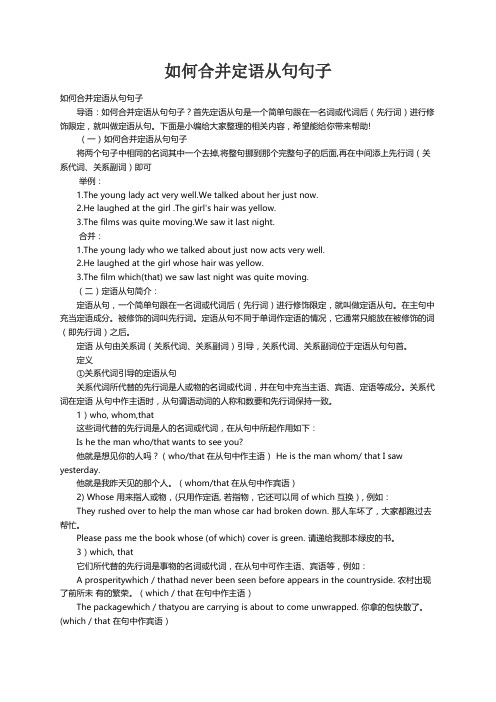
如何合并定语从句句子如何合并定语从句句子导语:如何合并定语从句句子?首先定语从句是一个简单句跟在一名词或代词后(先行词)进行修饰限定,就叫做定语从句。
下面是小编给大家整理的相关内容,希望能给你带来帮助!(一)如何合并定语从句句子将两个句子中相同的名词其中一个去掉,将整句挪到那个完整句子的后面,再在中间添上先行词(关系代词、关系副词)即可举例:1.The young lady act very well.We talked about her just now.2.He laughed at the girl .The girl's hair was yellow.3.The films was quite moving.We saw it last night.合并:1.The young lady who we talked about just now acts very well.2.He laughed at the girl whose hair was yellow.3.The film which(that) we saw last night was quite moving.(二)定语从句简介:定语从句,一个简单句跟在一名词或代词后(先行词)进行修饰限定,就叫做定语从句。
在主句中充当定语成分。
被修饰的词叫先行词。
定语从句不同于单词作定语的情况,它通常只能放在被修饰的词(即先行词)之后。
定语从句由关系词(关系代词、关系副词)引导,关系代词、关系副词位于定语从句句首。
定义①关系代词引导的定语从句关系代词所代替的先行词是人或物的名词或代词,并在句中充当主语、宾语、定语等成分。
关系代词在定语从句中作主语时,从句谓语动词的人称和数要和先行词保持一致。
1)who, whom,that这些词代替的先行词是人的名词或代词,在从句中所起作用如下:Is he the man who/that wants to see you?他就是想见你的人吗?(who/that在从句中作主语) He is the man whom/ that I saw yesterday.他就是我昨天见的那个人。
定语从句知识结构图解

定语从句知识结构图解不定式以及介词短语等来担任,也可以由一个句子来充当,充当定语功能的句概念:定语可以由形容词,名词,代词,分词,①指人的先行词子称为定语从句。
⒈先行词:被定语从句所修饰的名词或代词②指物的先行词★先行词还可以是前面整个句子所叙述的事情。
He has passed the driving test, which surprises all of us. (which替代前面所叙述的事情)先行词①替代前面的先行词(替代作用)关系词的作用②连接主句和定语从句(连接作用)③在定语从句中作句子成分(成分作用)定语从句“三要素”⒉关系词: 引导定语的词标准:根据关系词在从句中做的句子成分种类关系词的分类关系代词:在从句中做主,宾,表,定(that/which/who/whom/whose/as)关系副词:在从句中作状语(When/where/why)⒊定语从句:用来做定语,修饰限定先行词的句子。
①限制性定语从句:对先行词起限定修饰作用。
定He is a teacher who works at our school.定语从句的分类②非限制性定语从句:对先行词起补充说明作用 (先行词与定语从句之间有逗号隔开)语Beijing, which is the capital of China, is a beautiful city with a long history.比较: He has two sons, who work in the same company. (He has only two sons.)从He has two sons who work in the same company.(Perhaps he has two more sons)句①关系代词在定语从句中作宾语She is the girl (whom / that) I loved before. (可以省略whom/that)②关系代词在定语从句中作表语⒈关系代词的省略He is no longer the boy (that) he used to be. (可以省略that)限定性定语从句③关系代词作介词宾语,介词在从句句尾时可以省略Housing price is a problem (that/which) people are interested in.比较: Housing price is a problem in which peopleare interested.(此时只能用which且不能省略)①以疑问词who开头的句子中定语从句几个难点Who is the man that is shouting there?②关系代词在从句中作表语时用that的情况She is not the girl that she used to be.③先行词被the very, the right, the only修饰This is the very person that we are looking for.⒉先行词是人that/who的区别①先行词是one, ones, anybody, all, none, those 等Those who want to go to the cinema will have towait at the gate of the school.②句子中有两个定语从句,一个用了that,另外一用who的情况个用whoWho is the boy that won the gold medal?③在there be 结构中There are many young men who are against him.④在非限定性定语从句当中Tom, who is my best friend, has gone abroad to study..①在非限定性定语从句中She lost the game, which depressed her greatly.②关系词置于介词之后,作宾语.The pen with which you write is Jack's.用which的情况③先行词是that或定语从句中套定语从句,一个关系词用that,另一个用which.Let me show you the novel that I borrowed from thelibrary which is newly open to us.①先行词是不定代词如all, little, few, much,⒊先行词是物 anything, everything, nothing, none, no one等that / which的区别She did all that she could to help us.②先行词被all, every, no, some, little, much, the only,the very, the right,the last等所修饰时This is the very book thatI want.③先行词中既有人又有物时She described in her compositions the people and用that的情况the places that impressed her most.④先行词前有序数词或形容词最高级修饰时。
定语从句知识结构图解

定语从句知识结构图解定语从句知识结构图解概念:定语可以由形容词,名词,代词,分词,不定式以及介词短语等来担任,也可以由一个句子来充当,充当定语功能的句子称为定语从句。
①指人的先行词⒈先行词:被定语从句所修饰的名词或代词②指物的先行词★先行词还可以是前面整个句子所叙述的事情。
He has passed the driving test, which surprises all of us. (which替代前面所叙述的事情)先行词①替代前面的先行词(替代作用)关系词的作用②连接主句和定语从句(连接作用)③在定语从句中作句子成分(成分作用)定语从句“三要素”⒉关系词: 引导定语的词标准:根据关系词在从句中做的句子成分种类关系词的分类关系代词:在从句中做主,宾,表,定(that/which/who/whom/whose/as)关系副词:在从句中作状语(When/where/why)⒊定语从句:用来做定语,修饰限定先行词的句子。
①限制性定语从句:对先行词起限定修饰作用。
定He is a teacher who works at our school.定语从句的分类②非限制性定语从句:对先行词起补充说明作用(先行词与定语从句之间有逗号隔开)语Beijing, which is the capital of China, is a beautiful city with a long history.比较: He has two sons, who work in the same company. (He has only two sons.)从He has two sons who work in the same company. (Perhaps he has two more sons)句①关系代词在定语从句中作宾语She is the girl (whom / that) I loved before. (可以省略whom/that)②关系代词在定语从句中作表语⒈关系代词的省略He is no longer the boy (that) he used to be. (可以省略that)限定性定语从句③关系代词作介词宾语,介词在从句句尾时可以省略Housing price is a problem (that/which) people are interested in.比较: Housing price is a problem in which people are interested.此时只能用which且不能省略)①以疑问词who开头的句子中定语从句几个难点Who is the man that is shouting there?②关系代词在从句中作表语时用that的情况先行词被修饰This is the very person that we are looking for.⒉先行词是人that/who的区别ait at the gate of the school.用who的情况个用who③在there be 结构中There are many young men who are against him.④在非限定性定语从句当中Tom, who is my best friend, has gone abroad to study.①在非限定性定语从句中.he lost the game, which depressed her greatly.②关系词置于介词之后,作宾语.The pen with which you write is Jack’s.用which的情①先行词是不定代词如all, little, few, much,⒊先行词是物anything, everything, nothing, none, no one等that / which的区别She did all that she could to help us.This is the very book that I want.③先行词中既有人又有物时She described in her compositions the people and用that的情况the places that impressed her most.④先行词前有序数词或形容词最高级修饰时。
定语从句知识结构图解

定语从句知识结构图解概念:定语可以由形容词,名词,代词,分词,不定式以及介词短语等来担任,也可以由一个句子来充当,充当定语功能的句子称为定语从句。
①指人的先行词⒈先行词:被定语从句所修饰的名词或代词②指物的先行词★先行词还可以是前面整个句子所叙述的事情。
He has passed the driving test, which surprises all of us. (which替代前面所叙述的事情)先行词①替代前面的先行词(替代作用)关系词的作用②连接主句和定语从句(连接作用)③在定语从句中作句子成分(成分作用)定语从句“三要素”⒉关系词: 引导定语的词标准:根据关系词在从句中做的句子成分种类关系词的分类关系代词:在从句中做主,宾,表,定(that/which/who/whom/whose/as)关系副词:在从句中作状语(When/where/why)⒊定语从句:用来做定语,修饰限定先行词的句子。
①限制性定语从句:对先行词起限定修饰作用。
定He is a teacher who works at our school.定语从句的分类②非限制性定语从句:对先行词起补充说明作用(先行词与定语从句之间有逗号隔开)语Beijing, which is the capital of China, is a beautiful city with a long history.比较: He has two sons, who work in the same company. (He has only two sons.)从He has two sons who work in the same company. (Perhaps he has two more sons)句①关系代词在定语从句中作宾语She is the girl (whom / that) I loved before. (可以省略whom/that)②关系代词在定语从句中作表语⒈关系代词的省略He is no longer the boy (that) he used to be. (可以省略that)限定性定语从句③关系代词作介词宾语,介词在从句句尾时可以省略Housing price is a problem (that/which) people are interested in.比较:Housing price is a problem in which people are interested.(此时只能用which且不能省略)①以疑问词who开头的句子中定语从句几个难点Who is the man that is shouting there?②关系代词在从句中作表语时用that的情况She is not the girl that she used to be.③先行词被the very, the right, the only修饰This is the very person that we are looking for.⒉先行词是人that/who的区别①先行词是one, ones, anybody, all, none, those 等Those who want to go to the cinema will have towait at the gate of the school.②句子中有两个定语从句,一个用了that,另外一用who的情况个用whoWho is the boy that won the gold medal?③在there be 结构中There are many young men who are against him.④在非限定性定语从句当中Tom, who is my best friend, has gone abroad to study.①在非限定性定语从句中.She lost the game, which depressed her greatly.②关系词置于介词之后,作宾语.The pen with which you write is Jack’s.用which的情况③先行词是that或定语从句中套定语从句,一个关系词用that,另一个用which.Let me show you the novel that I borrowed from thelibrary which is newly open to us.①先行词是不定代词如all, little, few, much,⒊先行词是物anything, everything, nothing, none, no one等that / which的区别She did all that she could to help us.②先行词被all, every, no, some, little, much, the only,the very, the right,the last等所修饰时This is the very book that I want.③先行词中既有人又有物时She described in her compositions the people and用that的情况the places that impressed her most.④先行词前有序数词或形容词最高级修饰时。
定语从句的整合与拆分

识别并列连词:and、or、but等 拆分并列从句:将并列连词前后的从句拆分成独立的句子 调整语序:根据需要调整拆分后句子的语序 合并句子:使用适当的连词将拆分后的句子合并成一个完整的句子
定语从句整合与拆 分的注意事项
避免冗余:整合与拆分 定语从句时,要避免重 复使用相同的词汇或短 语,保持句子简洁明了。
合并后的定语从句 需要注意语序和时 态等问题,确保语 法正确
定语从句的拆分
确定主句和从句
去掉连词,将从句 单独成句
调整语序,确保语 法正确
替换连词,避免重 复
识别从句类型 确定主句和从句的关系 拆分从句,保留主句核心信息 整合拆分后的从句,形成完整的句子
拆分定语从句中的形容词 拆分定语从句中的副词 拆分定语从句中的介词短语 拆分定语从句中的非谓语动词避免使用重复或冗余的词汇
注意标点符号的正确使用
注意定语从句的整合与拆分不能影响句子的语法结构
在整合与拆分过程中,要确保定语从句与其他句子成分之间的逻辑关系清晰
避免出现重复的词汇或短语,保持句子的简洁明了 在整合与拆分过程中,要保持句子的整体风格和语气一致
确保主语和宾语完 整
注意时态和语态的 正确性
况。
将多个简单句合 并为一个复合句
使用连词将两个 简单句连接起来
合并后的复合句 结构清晰,易于 理解
合并多个从句可 以增强句子的表 达力
将多个定语从句合 并为一个定语从句, 使句子结构更加紧 凑
合并后的定语从句 可以用逗号连接多 个并列的修饰语
合并后的定语从句可 以包含一个主句和多 个从句,共同修饰同 一个名词或代词
保持连贯:在整合与拆 分定语从句时,要确保 句子的逻辑关系清晰, 避免出现歧义或混淆。
如何合并定语从句句子
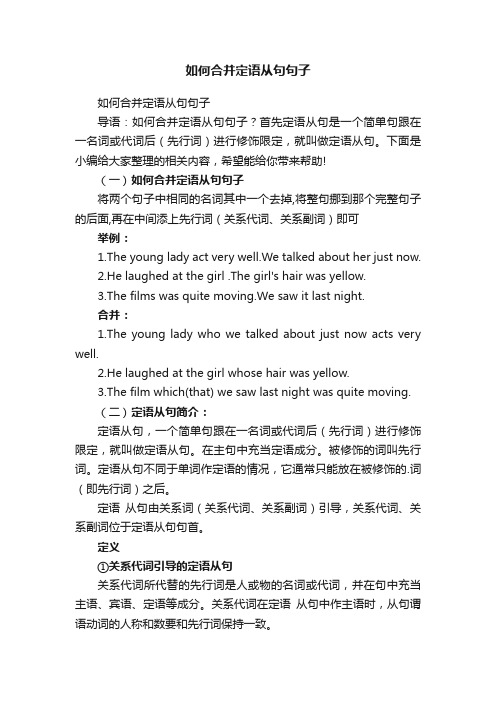
如何合并定语从句句子如何合并定语从句句子导语:如何合并定语从句句子?首先定语从句是一个简单句跟在一名词或代词后(先行词)进行修饰限定,就叫做定语从句。
下面是小编给大家整理的相关内容,希望能给你带来帮助!(一)如何合并定语从句句子将两个句子中相同的名词其中一个去掉,将整句挪到那个完整句子的后面,再在中间添上先行词(关系代词、关系副词)即可举例:1.The young lady act very well.We talked about her just now.2.He laughed at the girl .The girl's hair was yellow.3.The films was quite moving.We saw it last night.合并:1.The young lady who we talked about just now acts very well.2.He laughed at the girl whose hair was yellow.3.The film which(that) we saw last night was quite moving.(二)定语从句简介:定语从句,一个简单句跟在一名词或代词后(先行词)进行修饰限定,就叫做定语从句。
在主句中充当定语成分。
被修饰的词叫先行词。
定语从句不同于单词作定语的情况,它通常只能放在被修饰的.词(即先行词)之后。
定语从句由关系词(关系代词、关系副词)引导,关系代词、关系副词位于定语从句句首。
定义①关系代词引导的定语从句关系代词所代替的先行词是人或物的名词或代词,并在句中充当主语、宾语、定语等成分。
关系代词在定语从句中作主语时,从句谓语动词的人称和数要和先行词保持一致。
1)who, whom,that这些词代替的先行词是人的名词或代词,在从句中所起作用如下:Is he the man who/that wants to see you?他就是想见你的人吗?(who/that在从句中作主语)He is the man whom/ that I saw yesterday.他就是我昨天见的那个人。
2023届高三英语应用文句式写作指导讲义(倒装句定语从句名词性从句非谓语结构虚拟语气)
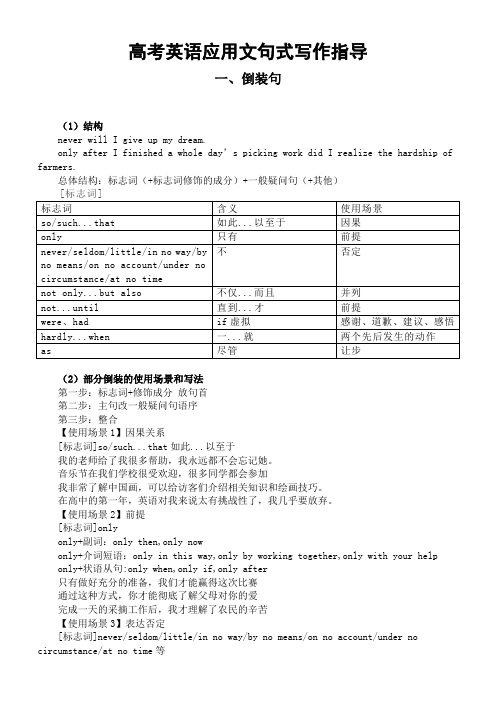
高考英语应用文句式写作指导一、倒装句(1)结构never will I give up my dream.only after I finished a whole day’s picking work did I realize the hardship of farmers.总体结构:标志词(+标志词修饰的成分)+一般疑问句(+其他)(2)部分倒装的使用场景和写法第一步:标志词+修饰成分放句首第二步:主句改一般疑问句语序第三步:整合【使用场景1】因果关系[标志词]so/such...that如此...以至于我的老师给了我很多帮助,我永远都不会忘记她。
音乐节在我们学校很受欢迎,很多同学都会参加我非常了解中国画,可以给访客们介绍相关知识和绘画技巧。
在高中的第一年,英语对我来说太有挑战性了,我几乎要放弃。
【使用场景2】前提[标志词]onlyonly+副词:only then,only nowonly+介词短语:only in this way,only by working together,only with your help only+状语从句:only when,only if,only after只有做好充分的准备,我们才能赢得这次比赛通过这种方式,你才能彻底了解父母对你的爱完成一天的采摘工作后,我才理解了农民的辛苦【使用场景3】表达否定[标志词]never/seldom/little/in no way/by no means/on no account/under no circumstance/at no time等去中国朋友家里做客绝不应该迟到我们永远不会忘记你给我们的慷慨帮助你的妈妈永远不会伤害你【使用场景4】并列关系[标志词]not only...but also她不仅教给我们有用的知识,还给予我们及时的精神鼓励这些活动中,我们不仅能收获友谊,还能缓解身心压力在体育运动中,我们不仅可以提升身体素质,还可以培养团队精神在常规训练中,我们不仅要锻炼个人能力,还要增强团队合作我不仅可以帮忙组织活动,还可以现场展示中国画绘画技巧【使用场景5】前提[标志词]not...until...直到...才...直到我跑完全程,我才理解了坚持的重要性直到你离开学校,你才能真正感觉到学校生活的价值直到完成了所有的工作,我才理解了父母的辛苦【使用场景6】表达感谢/道歉/建议/感悟等[标志词]were/had(if虚拟条件句)如果我是你,我会和她面对面坦诚沟通一次如果不是因为你耐心的指导,我无法克服困难,树立信心。
定语从句的整合与拆分精编版

Grammar:定语从句(Attributive Clauses)定义:定语从句(Attributive Clauses):由关系词(关系代词或关系副词)引导的从句,其作用是作定语修饰主句的某个名词和代词,相当于形容词,所以又称为形容词性从句,一般紧跟在它所修饰的先行词后面。
被定语从句修饰的词叫先行词,引导定语从句的词叫关系词。
关系词可分为关系代词(who, whom, whose, which, that)和关系副词(when, where, why) 关系词都充当从句的某个成分,它所替代的相应成分应省去。
在定语从句中,当who, which, that作主语时,谓语的单复数应与先行词保持一致。
关系词常有3个作用:①引导定语从句。
①代替先行词。
①在定语从句中担当一个成分。
定语从句分为限制性定语从句和非限制性定语从句。
非限制性定语从句与先行词的关系不如限制性定语从句与先行词的关系紧密,没有它,主句的意思也清楚,因此用逗号隔开。
关系词在非限制性定语从句中的用法与在限制性定语从句中的用法基本一样。
一.关系代词以及基本用法关系代词指代对象作用例句That人. 物主.(宾).表语The student that answered the question was John. The book (that) you lent me was interesting.Which物主.(宾)Football is a game which is liked by most boys.This is the pen (which) he bought yesterday.Who人主.(宾) A doctor is a person who looks after people's health.The man(who)you met just now is my friend.Whom人(宾)The man(whom)you met just now is my friend.Mr. Ling is just the boy(whom)I want to see.Whose人.物定He has a friend whose father is a doctor.Please pass me the book whose (of which) cover is green.注意一:1)介词后面的关系词不能省略。
定语从句的整合与拆分
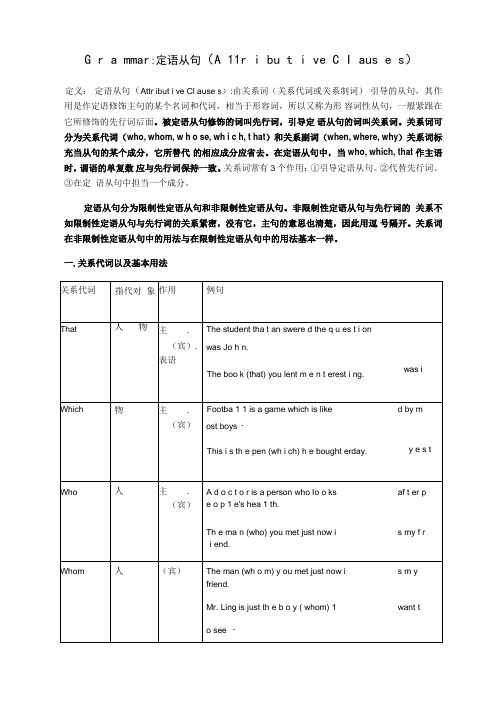
G r a mmar:定语从句(A 11r i bu t i ve C I aus e s)定义:定语从句(Attr ibut i ve Cl ause s):由关系词(关系代词或关系制词)引导的从句,其作用是作定语修饰主句的某个名词和代词,相当于形容词,所以又称为形容词性从句,一般紧跟在它所修饰的先行词后面。
被定语从句修饰的词叫先行词,引导定语从句的词叫关系词。
关系词可分为关系代词(who, whom, w h o se, wh i c h, t hat)和关系副词(when, where, why)关系词标充当从句的某个成分,它所替代的相应成分应省去。
在定语从句中,当who, which, that作主语时,谓语的单复数应与先行词保持一致。
关系词常有3个作用:①引导定语从句。
②代替先行词。
③在定语从句中担当一个成分。
定语从句分为限制性定语从句和非限制性定语从句。
非限制性定语从句与先行词的关系不如限制性定语从句与先行词的关系紧密,没有它,主句的意思也清楚,因此用逗号隔开。
关系词在非限制性定语从句中的用法与在限制性定语从句中的用法基本一样。
一.关系代词以及基本用法注意一:1 )介词后面的关系词不能省略。
2) that前不能有介词。
模仿范例,把下列两个简单句合成带有定语从句的复合句。
1・ The b oys are f r om Class One・ The bo y s are playing f o otbal I・(1) 第一句为主句,第二句为从句,将两个单句合并为一句。
The boys (the boys are playing foo t ball) are from Cl a ss On e・(2) 括号中句子里的主语the boys,和先行词是同一个词,应该用关系词替换从句中重复的the boy s . The boys在从句中作主语,关系词中能作主语并代表人的是who, t h atTh e boys(who\that are playing f o otbal I ) are from Class One.(3) wh o \that = =the boys, 在定语从句中做主语的成分,并连接先行词和定语从句。
定语从句的结构及理解

. 定语从句的结构及理解2. 定语从句的关系词的使用3. 定语从句的简化表达知识总结归纳(一)定语从句分为限定性定语从句和非限定性定语从句:限定性定语从句:从句对先行词进行必要的描述或说明,缺少它,则句义显得不完整,从句与先行词紧密相连。
非限定性定语从句:对先行词进行补充说明,解释,它与先行词之间有逗号隔开。
1. Before she could move, she heard a loud noise, which grew to a terrible roar.2. Tree after tree went down, cut down by the water, which must have been three meters deep.3. Flora, whose beautiful hair and dress were all cold and wet, started crying.4. Their talk includes rhythm and rhyming words as well as tongue twisters, which often make the audience applaud.(二)定语从句的结构:在复合句中,修饰某个名词或代词的句子(做这个名词或代词的定语)叫定语从句,定语从句一般放在被修饰的名词或代词后面,被修饰的名词或代词叫做定语从句的先行词,它与定语从句之间要有一个词连接,这个词指代先行词的内容叫做关系词(关系代词或关系副词:that, which, who, whose, when, where, why)。
先行词在定语从句中充当主语,宾语,时间,地点,原因状语。
结构:先行词+关系词+定语从句。
1. There she saw a wall of water that was quickly advancing towards her.2. In Japan, someone who sees another person making the gesture will think it means money.3. A theme park is a collection of rides, exhibitions or other attractions that are based on a common theme.4. The park has a conservation center that helps protect marine animals and their habitats in the rivers and coastal waters of Asia.5. Visitors can go on exciting rides where they can feel what it is like to do the things they have seen their heroes do in the movie.6. Oprah Winfrey is a black woman whose rise to fame is an inspiring story.(三)关系词前面可以根据定语从句的内容加上一些介词,这些关系词在介词后面常用which 或whom.1. There was a man with whom I would have to work together and finally the manager of the company.2. Many people who saw the film were afraid to swim in the sea when they remembered the scenes in which people were eaten by the shark.知识重点与难点(一)当先行词有最高级,序数词修饰,是不定代词,或是all, no, only等形式时,关系代词一般用that,而不能用which。
定语从句解剖及详解资料
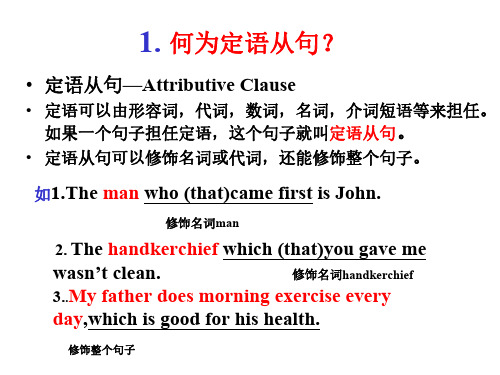
修饰整个句子
2.定语从句的构成
定语从句所修饰的词叫作先行词,而引导定语从句的 词叫关系词(关系代词和关系副词)。关系词一般 紧跟在先行词之后引导定语从句。
如:There was a young man who liked paintings. 句中, who为关系代词,定语从句who liked
paintings修饰先行词a young man 。
5. The woman who(that) is speaking at the meeting is my mother.正在会上讲话的妇女是我的妈妈。
6. 基 础 练 习
把下面的句子改成定语从句:
1. I know the boy. He can speak English well. 2. Mary bought a little bird. It was very pretty. 3. The season is summer. It comes after spring. 4. I have a friend. His father is a teacher 5. That building is my uncle’s house. Its wall is white. 6. He is a singer. I like his songs very much. 7. The man was American. I spoke to him yesterday. 8. I can’t find the house. My friend lives in it. 9. I know the boy. You are looking for him. 10. This is the town. He was born in the town.
立刻说:怎么拆分定语从句

怎样拆分定语从句要彻底理解定语从句,一定要运用“拆分”的思想,把主句+很长的定语从句拆分开来。
I am looking for a man who is rich, cute and well-educated.我在寻找一个有钱,帅,而且很有教养的男生。
首先把这个定语从句拆分:1. I am looking for a man.2. The man is rich, cute and well-educated.接下来组合:I am looking for (a man the man) is rich, cute and well-educated.括号内a man和the man信息重复了,位于前面的词称之为先行词,后面一词我们可以把它叫做“后行词”。
既然信息重复,为什么不能干脆删掉后行词?如果直接删掉后行词,会导致一个句子有两套主谓,关系会变得混乱,例如:I am looking for a man is rich, cute and well-educated.如果直接保留后行词,会造成重复,为了避免重复(众所周知,英文最讨厌重复),我们将后行词进行转变,在上例中the man变为who,经过转变之后,后行词除了具备原来的词义之外,还增加了连词的作用。
一、Who/whom后行词是人,就用who/that来替代。
但是如果后行词是宾格,即him,them,her,可以用whom进行替代,也可以直接用who。
He is the boy who/whom I will go to shanghai with.拆分:1. He is the boy.2. I will go to shanghai with him.这两句的关联部分就是the boy和him,也就是所谓的先行词和后行词。
为了衔接连贯,后行词需要前置,句2就变成:Him I will go to shanghai with.然后再将him替换为who或者whom:He is the boy who/whom I will go to shanghai with.有的时候,介词和后行词的关系十分密切,如果只前置后行词,它们的修饰关系就不明显,所以通常是将后行词和介词一起前置:With him I will go to shanghai.这个时候就只能使用whom替换him,把句子变成:He is the boy with whom I will go to shanghai.而不能写成这种形式:He is the boy with who I will go to shanghai二、Which/that后行词是表事物的名词,就用which或者that替换。
定语从句速学法——拆合法

定语从句速学法——拆合法定语从句是英语学习的难点,也是考试的重点。
因此要有一种比较简单的方法学习定语从句是很有必要的。
下面,我将一种见到有效的定语从句学习法——拆合法,介绍给大家。
一、定语从句的概念定语从句(Attributive Clauses)在句中做定语,修饰一个名词、名词词组或代词,被修饰的名词、词组或代词成为先行词。
定语从句由关系词(关系代词或关系副词)引出,通常出现在先行词之后。
首先我们来认识一下定语从句:The man who has a book in先行词关系词定语从句his hand is my teacher.二、定语从句是由两个单句合并而成,所以,任何一个定语从句都可以拆分成两个独立的单句1.句1,The man is my teacher.句2,The man has a book in his hand.Who这两个简单句中重复内容是The man ,指人,作主语,用who 替代句2中的the man。
The man is my teacher.Who has a book in his hand.再把这个由Who引导的从句放在The man的后面,完整的定语从句是:The man who has a book in his handWho引导的定语从句is my teacher.2.(2009全国1)She brought with her three friends, none of CI had ever met before.A.themB.whoC.whomD.these上面的定语从句可以拆分成2个单句:句1,She brought with her three friends.句2,None of them I had everwhommet before.句2中的them指代的是句1中的three friends,与句1中的three friends重复。
翻译技巧课时(一):拆分和合并
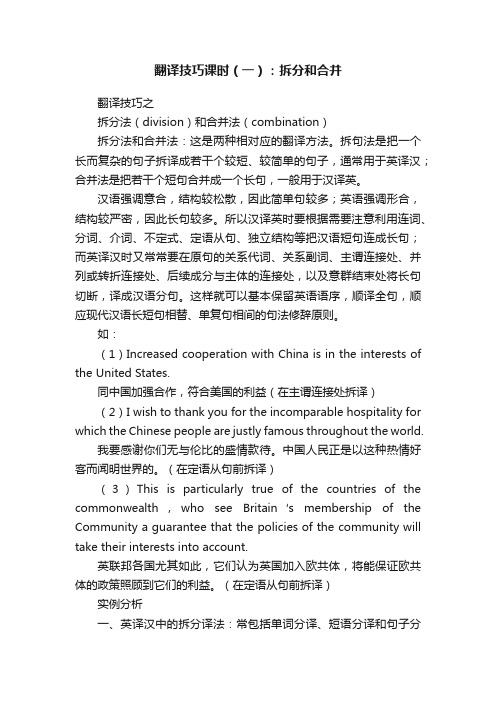
翻译技巧课时(一):拆分和合并翻译技巧之拆分法(division)和合并法(combination)拆分法和合并法:这是两种相对应的翻译方法。
拆句法是把一个长而复杂的句子拆译成若干个较短、较简单的句子,通常用于英译汉;合并法是把若干个短句合并成一个长句,一般用于汉译英。
汉语强调意合,结构较松散,因此简单句较多;英语强调形合,结构较严密,因此长句较多。
所以汉译英时要根据需要注意利用连词、分词、介词、不定式、定语从句、独立结构等把汉语短句连成长句;而英译汉时又常常要在原句的关系代词、关系副词、主谓连接处、并列或转折连接处、后续成分与主体的连接处,以及意群结束处将长句切断,译成汉语分句。
这样就可以基本保留英语语序,顺译全句,顺应现代汉语长短句相替、单复句相间的句法修辞原则。
如:(1)Increased cooperation with China is in the interests of the United States.同中国加强合作,符合美国的利益(在主谓连接处拆译)(2)I wish to thank you for the incomparable hospitality for which the Chinese people are justly famous throughout the world.我要感谢你们无与伦比的盛情款待。
中国人民正是以这种热情好客而闻明世界的。
(在定语从句前拆译)(3)This is particularly true of the countries of the commonwealth,who see Britain‘s membership of the Community a guarantee that the policies of the community will take their interests into account.英联邦各国尤其如此,它们认为英国加入欧共体,将能保证欧共体的政策照顾到它们的利益。
- 1、下载文档前请自行甄别文档内容的完整性,平台不提供额外的编辑、内容补充、找答案等附加服务。
- 2、"仅部分预览"的文档,不可在线预览部分如存在完整性等问题,可反馈申请退款(可完整预览的文档不适用该条件!)。
- 3、如文档侵犯您的权益,请联系客服反馈,我们会尽快为您处理(人工客服工作时间:9:00-18:30)。
Grammar:定语从句(Attributive Clauses)定义:定语从句(Attributive Clauses):由关系词(关系代词或关系副词)引导的从句,其作用是作定语修饰主句的某个名词和代词,相当于形容词,所以又称为形容词性从句,一般紧跟在它所修饰的先行词后面。
被定语从句修饰的词叫先行词,引导定语从句的词叫关系词。
关系词可分为关系代词(who, whom, whose, which, that)和关系副词(when, where, why) 关系词都充当从句的某个成分,它所替代的相应成分应省去。
在定语从句中,当who, which, that作主语时,谓语的单复数应与先行词保持一致。
关系词常有3个作用:①引导定语从句。
②代替先行词。
③在定语从句中担当一个成分。
定语从句分为限制性定语从句和非限制性定语从句。
非限制性定语从句与先行词的关系不如限制性定语从句与先行词的关系紧密,没有它,主句的意思也清楚,因此用逗号隔开。
关系词在非限制性定语从句中的用法与在限制性定语从句中的用法基本一样。
一.关系代词以及基本用法注意一:1)介词后面的关系词不能省略。
2)that前不能有介词。
模仿范例,把下列两个简单句合成带有定语从句的复合句。
1. The boys are from Class One. The boys are playing football.(1)第一句为主句,第二句为从句,将两个单句合并为一句。
The boys(the boys are playing football) are from Class One.(2) 括号中句子里的主语the boys, 和先行词是同一个词,应该用关系词替换从句中重复的the boys. The boys 在从句中作主语,关系词中能作主语并代表人的是who, thatThe boys(who\that are playing football) are from Class One.(3) who\that==the boys, 在定语从句中做主语的成分,并连接先行词和定语从句。
2. I found the letter. The letter came yesterday.(1)第一句为主句,第二句为从句,将两个单句合并为一句。
I found The letter( the letter came yesterday).(2)用关系词替换从句中重复的the letter, 关系词中能作主语并代表物的是which, thatI found The letter(which\that came yesterday).(3)which\that==the letter, 在定语从句中做主语的成分,并连接先行词和定语从句。
3. The man is my friend. You met the man just now(1)第一句为主句,第二句为从句,将两个单句合并为一句。
The man (you met the man just now) is my friend.(2)用关系词替换从句中重复的the man, 关系词中能作宾语并代表人的是whom, thatThe man (whom\that you met just now) is my friend.(3)whom\that==the man, 在定语从句中做宾语的成分,并连接先行词和定语从句。
做宾语的关系词whom\that 可以省略The man ( you met just now) is my friend.4. I helped the man. The man’s car was broken.(1)第一句为主句,第二句为从句,将两个单句合并为一句。
I helped the man (the man’s car was broken).(2) the man’s 是名词所有格,起到定语的作用修饰car, 用关系词替换从句中重复的the man, 关系词中能作定语,表示“谁的”是whoseI helped the man (whose car was broken).(3) whose=the man’s, 在定语从句中做定语,并连接先行词和定语从句。
Whose不但可以表示“谁的”,还可以指物,表示“什么的”。
例如:I once lived in a house. The roof of the house has fallen in./ The house’s roof has fallen in.I once lived in a house (the roof of the house has fallen in)/I once lived in a house (t he house’s roof has fallen in.)此句可改为:I once lived in a house (the roof of which has fallen in)/(whose roof has fallen in).介词+关系代词可提前,此句还可改为I once lived in a house (of which the roof has fallen in)5. This news is coming fromthe country. The country is on the other side of the world.→This news is coming from the country which/that is on the other side of the world.6.The minerals were unusual. We found them in the rocks.→The minerals wh ich/that we found in the rocks were unusual.7. This rocket is being built for the satellite. The satellite will be sent into space next year.→This rocket is being built for the satellite which/that will be sent into space next year.8. The house is our home. Its door is green/the door of the house is green.→The house whose door is green is our home./ The house the door of which is green is our home./The house of which the door is green is our home.9. I see some trees. The leaves of these trees are white.→ I see some trees whose leaves are white. / I see some trees the leaves of which are white./ I see some trees of which the leaves are white.练习1.The boy came to see me yesterday. He is Tom's brother.______________________________________________________________________ 2. The machines were connected with wires. The wires were very old ._______________________________________________________________________3. I know the boy. You gave a book to him.______________________________________________________________________4. We had dinner with John. He told us stories about his travels .____________________________________________________________________ 5. Will you please lend me the very book? You bought it last Sunday.______________________________________________________________________ 6. The student is our monitor. Our headmaster praised him at the school meeting._____________________________________________________________________ 7. He works in a middle school. There is a river in front of the school ._______________________________________________________________________ 8. He used to live in a big house. In front of it grew many banana trees.________________________________________________________________________ 9. They passed a factory. At the back of the factory there were rice fields._____________________________________________________________________ 10. The soldier ran to the building. On the top of it flew a flag._____________________________________________________________________ 11. In the evening they arrived at a hill. At the foot of the hill there was a temple.________________________________________________________________________ 12. She came into a big room. In the middle of it stood a large table.________________________________________________________________________13.We had to circle around the city in our plane. It looked very beautiful.________________________________________________________________________ 14. Do you know the doctor? He comes here once a month and examines the workers.________________________________________________________________________15. The foreign guest is Mr. Green.You saw him at the school gate.________________________________________________________________________16. He is the new head. I was talking about him this morning._______________________________________________________________________17. I 've received the book. Father sent it to me________________________________________________________________________18.The doctor cured me of fever. He always worked heart and soul .________________________________________________________________________ 19.The experiment failed. The scientist was working on it day and night._______________________________________________________________________ 20. What's the name of the girl? Her grandpa took part in the Long March.______________________________________________________________21.The building is my uncle's house. Its wall is white._______________________________________________________________22. That house is mine. The window of the house is blue._______________________________________________________________23.The boy was quickly taken to hospital. His legs were badly hurt._______________________________________________________24.Is the notebook yours? Its cover is green._______________________________________________________25. I have a pen friend. His father is a policeman._______________________________________________________26. We will visit the town. I have heard of its name._______________________________________________________27. The boss had heard about the accident. Mr King worked in his company._______________________________________________________28.The lady is very pleased .You found her purse ._______________________________________________________把下列含有定语从句的句子拆分成两个简单句。
